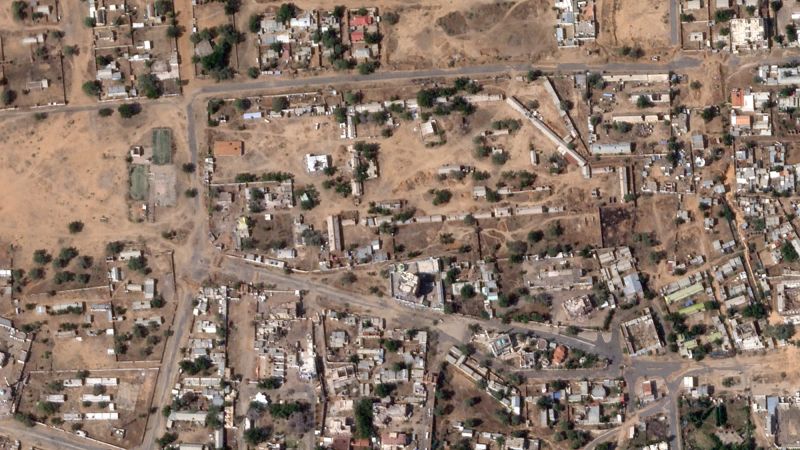Sudanese rebels have driven government forces out of El Fasher, the Sudanese regime’s last stronghold in the western Darfur region, amid a brutal struggle for territory that has led to allegations of genocide and created one of the world’s worst humanitarian crises.
For more than a year, the militia Rapid Support Forces (RSF) has been besieging El Fasher, the last major barrier to control of Darfur. RSF aims to establish a parallel government in the region. Since April 2023, it has been fighting over power with the Sudanese Armed Forces (SAF).
According to estimates, the conflict has killed more than 150,000 people and displaced another 14 million.
Abdel Fattah al-Burhan, the commander of Sudan’s military who is also the de facto head of state, acknowledged the occupation of El Fasher by rebel forces. In a broadcast on Monday, he said that troops were withdrawn from the city due to the destruction and systematic killing of civilians.
Justin Lynch, a Sudanese researcher and managing director of the Conflict Insights Group, a data analysis and conflict monitoring organization, told CNN that RSF’s capture of El Fasher marks “the beginning of what we fear is a massacre of civilians.”
Hundreds of thousands of civilians remain trapped in El Fasher, lacking food and medical care, said UN humanitarian chief Tom Fletcher. He reported that escape routes were blocked amid “heavy shelling and ground attacks” that “engulfed the city.”

RSF claimed it was committed to protecting civilians in El Fasher and providing safe passage for those seeking to escape from El Fasher.
But the U.N. human rights office said it had received “multiple alarming reports” that the RSF was committing atrocities, including summary executions of civilians, and videos showing dozens of unarmed men being shot or lying dead surrounded by RSF fighters.
It also cited “signs of ethnic motivation for the killings.”
“The risk of ethnically targeted attacks is particularly high against non-Arab groups,” said Jalaleh Getachew Bir, a senior analyst at the Armed Conflict Location and Event Data Project (ACLED), a crisis monitoring group.

Between April 2023 and mid-October 2025, her organization recorded 390 incidents of violence against civilians in El Fasher and surrounding areas, resulting in more than 1,300 deaths, as well as 180 attacks against internally displaced persons (IDPs), resulting in at least 830 deaths.
Ethnically motivated killings have been a feature of the conflict, particularly in Darfur, from the beginning. The region experienced its worst period of ethnic violence in 2023, with hundreds of people from non-Arab ethnic groups massacred by the RSF and affiliated forces.
For the past 30 months, military leader al-Burhan and RSF leader Mohamed Hamdan Dagalo have been fighting over control of Sudan.
The pair, once allies and among the country’s most powerful generals, jointly ousted President Omar al-Bashir from power in 2019.
They also played a key role in the 2021 coup that saw al-Burhan seize control from Sudan’s interim government.
Both generals are under Western sanctions for their involvement in war crimes. However, Dagalo’s RSF, along with allied Arab militias, has been accused by the United States of committing genocide during the ongoing civil war. This is the second time in 20 years that the United States has declared genocide in Sudan.
In its declaration in January, the US government said the RSF had carried out “direct attacks against civilians” including systematic killings “on an ethnic basis, including men and boys, and even infants.”

The magazine also said they “deliberately targeted women and girls from certain ethnic groups for rape and other brutal sexual violence” and “targeted fleeing civilians, killing innocent people fleeing the conflict and preventing remaining civilians from accessing life-saving supplies.”
Sudan’s military government has accused the United Arab Emirates of supplying arms to the RSF, a charge the UAE denies.
The RSF is a paramilitary force with an estimated 100,000 fighters, about half the size of the SAF.
RSF has a history tied to ethnic-based violence.
The group originated from the Arab Janjaweed militia involved in genocide in Darfur in the early 2000s. As a result, an estimated 300,000 people died.
Recent killings in El Fasher and other parts of Darfur reflect a pattern of targeted violence similar to that seen during previous massacres.
Lynch said the RSF’s occupation of El Fasher “will only mean more misery for civilians.”
Why is El Fasher’s capture important and what happens next?
According to Bir, the RSF’s capture of El Fasher, the capital of North Darfur state, marks an important turning point that will allow the RSF to consolidate its control over the greater Darfur region.
This comes after the SAF regained control of the capital Khartoum from the RSF earlier this year.
The fighting is now expected to move to the central oil-rich Kordofan region, which borders Darfur, Bir said.
RSF announced on Saturday that it had captured Bara, an important transport hub in North Kordofan province that connects the strategic town to the rest of the country.
“In Kordofan, the SAF and its allies are seeking to secure the main route between central Sudan and the Darfur region, while the RSF is working to tighten control of both regions to suppress an alternative government in western Sudan,” Bir said.

“The outcome of the fighting in El Fasher and Kordofan is likely to determine the future trajectory of the Sudanese conflict and the country’s political future,” she added.
Lynch said the capture of El Fasher, and by extension all of Darfur, would put RSF in a stronger negotiating position amid a global movement for a ceasefire.
International human rights lawyer Jonah Diamond told CNN that as violence escalates in Sudan and civilian casualties rise in El Fasher, the international community needs to intervene, asking whether world leaders will “allow RSF to once again commit genocide in Darfur with impunity.”
“Now is the time for urgent action to end the bloodshed, open humanitarian corridors and protect what is left of the people of El Fasher and the conscience of the world,” he said.

